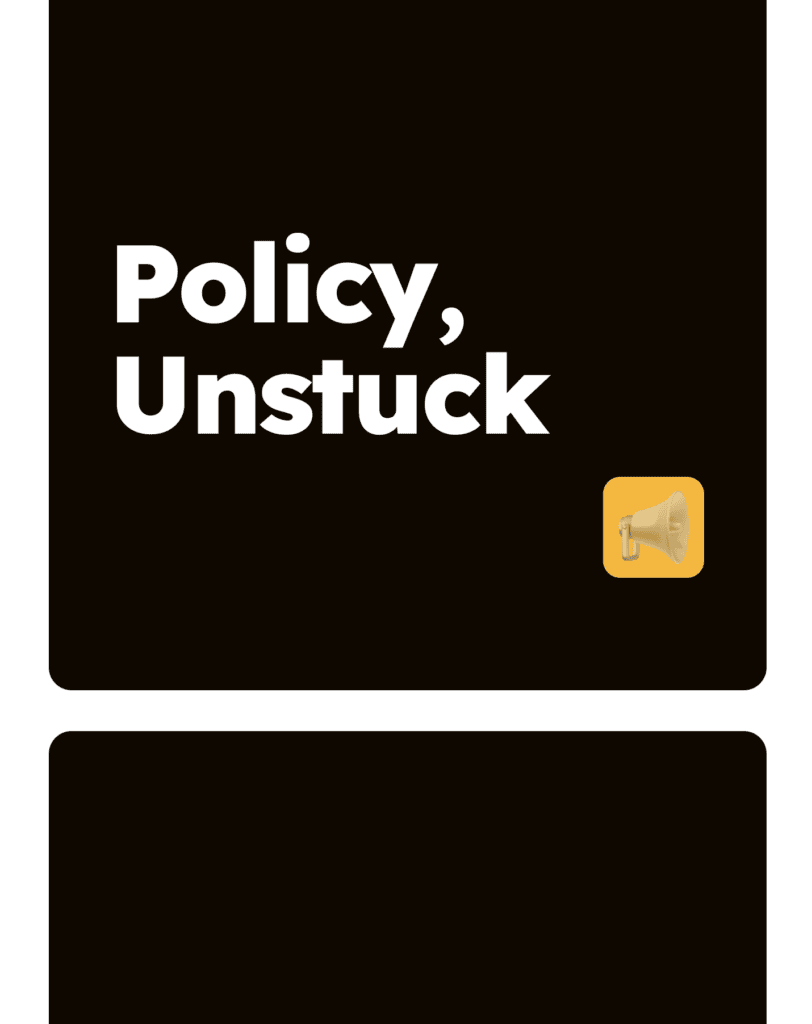This interview with {DAVID MCNAIR} is part of the {GETTING POLICY UNSTUCK} series. David is the Executive Director of Global Policy at the One Campaign.
#18: How the ONE Campaign rewired its influence strategy – David McNair
If your incentive is to shift policy, you’d be doing things differently. The effectiveness of policy researchers at spotting moments where they can actually change policy comes down to incentives. Some researchers are incentivised to have a well-researched report published under their name on a credible institution’s website. That’s great, and there’s lots of good content out there. But if your incentive were to shift policy, you’d be doing things quite differently. In my organisation, I get zero credit for just publishing a report. How do your organisational incentives align with your goals for policy influence?
One report had only been downloaded 16 times. We were going through this process of publishing a big report every year, sometimes 150 pages long, taking six months to produce. I asked our team to pull out the statistics on who was downloading our analysis, and we found that one report had only been downloaded 16 times. That kicked off a whole reorientation. We started asking: What are our objectives? Who are our audiences? What do they need in a context where people aren’t reading long reports anymore? This kind of honest assessment of impact is crucial for organisations to stay effective.
You need to keep evolving. We’ve got a pull strategy and a push strategy now. The pull strategy is analysis and data that’s relevant to the communities we want to keep coming back to us. The push strategy is social media threads, channels, and newsletters that talk about current issues, and bring our analysis to bear on those issues. Once you step on that treadmill, it’s never-ending because the channels, tools, and culture are always shifting. For a while, we had massive success with Twitter threads, sometimes getting a million views. Now, no one’s looking at Twitter. You need to continually experiment and stay current.
There’s a conspiracy in the policy world. Instead of producing a product and then thinking about communications afterwards, we now think about communications first, then design the product, then execute. There’s been a perception that in doing so, you’re instrumentalising the purity of the research and it won’t be as good. We put a real emphasis on making sure our data is always up to date, credible, and fact-checked. But there’s a kind of conspiracy happening in the policy world where people use knowledge and language as power. If you use acronyms and technical jargon, you’re basically saying, “I understand this, and I’m excluding you from the circle that understands it.” That might have worked 10-20 years ago, but not in the way that power is distributed now. Having the accuracy of data but reflecting the nuance of the analysis in a way that doesn’t exclude is what we try to do. When it’s done well, it looks really easy, but it’s actually really hard.
We’re not in a world where there’s one place to get a decision. I’m not sure I would say multilateralism is declining. The influence of the UN and the G7 are waning for sure, but lots of other multilateral spaces are in demand. More than 40 countries applied to join the BRICS last year. In part, that’s just reality, and in part, it’s actually a good thing because it’s recognising a shift of power from the last 80 years which has been dominated by a small number of countries. We’re not in a world where there’s one place where you can get a decision. So if governments, NGOs, businesses or activists have got an agenda, they need to pursue that agenda within lots of different coalitions. It’s a lot more difficult to make change happen, but that need to be present at multiple forums is a reality.
Shifting the Overton window is really hard – and we’re kind of losing at it. We need long-term strategies that expand the Overton window, and we need tactical things that we can get over the line every six months. The problem is, in the current world we live in, Overton window shifting is really hard, and those focused on sustainable development are kind of losing at it. Therefore, there are more incentives to say, “Let’s get this small thing over the line and demonstrate that we’re still delivering impact.” The problem with that is that as the Overton window closes, your opportunities to get those tactical wins just get smaller and smaller. On the other hand, the Brexit campaign and Steve Bannon’s transnational populist nationalist movement have been pretty successful. These are long-term, 20-year campaigns, and you can’t achieve those kinds of wins in a six-month or annual funding cycle.
Sometimes the moments for influencing come out of nowhere. Shaping global moments starts with analysis. What’s the problem you’re trying to solve? Who can make a decision to solve it? Who do they listen to? How do you shape their thinking through research, analysis, people they trust, media pressure, or whatever it might be? It can be a methodical process, or when you’ve been through it many times, it becomes intuitive. Sometimes the moments for influencing come out of nowhere, and you have to know when to jump on them.


